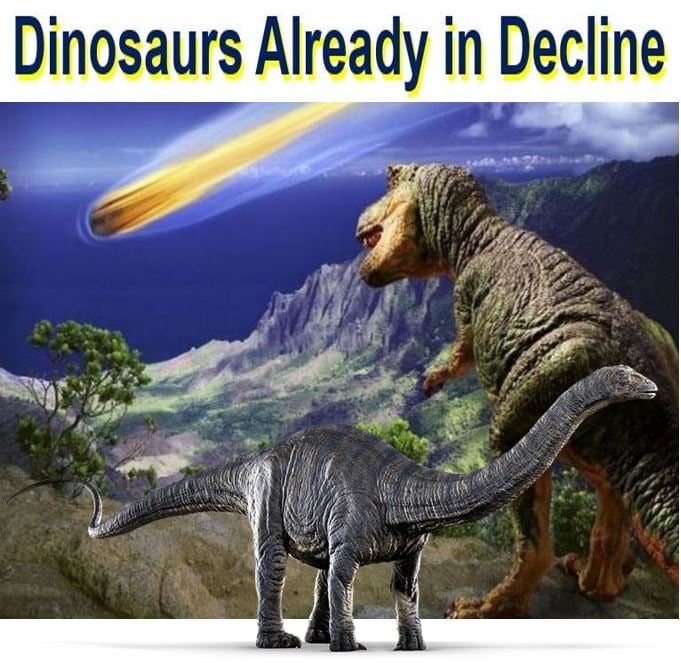Dinosaurs had already been in decline before the catastrophic asteroid that struck Earth 66 million years ago, says a team of scientists from the Universities of Bristol and Reading in England. Dinosaurs had been in evolutionary decline for several tens of millions of years before the impact.
The findings of a new study, the details of which have been published in the Proceedings of the National Academy of Sciences (citation below), provide a revolution in the understanding of dinosaur evolution, the authors say.
 The giant asteroid that hit Earth 66 million years ago finished off the dinosaurs, which were already in decline, this new study suggests.
The giant asteroid that hit Earth 66 million years ago finished off the dinosaurs, which were already in decline, this new study suggests.
Dinosaurs not thriving right up to collision day
Before this study, palaeontologists (scientists who study fossils) had believed that dinosaurs were thriving right up until the colossal meteorite struck Earth off the coast of Yucatan in the Caribbean Sea.
Professor Mike Benton of the University of Bristol, Dr. Manabu Sakamoto and Dr. Chris Venditti, both from the University of Reading, used sophisticated statistical analysis together with data from the fossil record to show that from 50 million years before the impact, dinosaur species had been dying out at a faster rate than new ones were emerging.
Their analyses showed that while the decline in the number of species over time was effectively ubiquitous among every dinosaur group, their patterns of species loss were not the same.
For example, the long-necked, leaf-eating sauropod dinosaurs were declining faster than all the other species, while theropods were in a more gradual decline. Theropods included many large carnivorous species such as the iconic Tyrannosaurus rex.
 Before the asteroid struck, sauropods (left) were already in rapid decline, while theropods (right) were in gradual decline.
Before the asteroid struck, sauropods (left) were already in rapid decline, while theropods (right) were in gradual decline.
Researchers were surprised
Dr. Sakamoto, the palaeontologist who led the study, said:
“We were not expecting this result. While the asteroid impact is still the prime candidate for the dinosaurs’ final disappearance, it is clear that they were already past their prime in an evolutionary sense.”
“Our work is ground-breaking in that, once again, it will change our understanding of the fate of these mighty creatures. While a sudden apocalypse may have been the final nail in the coffin, something else had already been preventing dinosaurs from evolving new species as fast as old species were dying out.”
“This suggests that for tens of millions of years before their ultimate demise, dinosaurs were beginning to lose their edge as the dominant species on Earth.”
Regarding how dinosaurs were coping before the impact, Prof. Benton said:
“All the evidence shows that the dinosaurs, which had already been around, dominating terrestrial ecosystems for 150 million years, somehow lost the ability to speciate fast enough. This was likely to have contributed to their inability to recover from the environmental crisis caused by the impact.”
 Prof. Mike Benton (left), Dr. Manabu Sakamoto (middle) and Dr. Chris Venditti.
Prof. Mike Benton (left), Dr. Manabu Sakamoto (middle) and Dr. Chris Venditti.
What happened 66 million years ago?
According to geological evidence, an asteroid about 6 miles (10 km) wide struck Earth approximately 66 million years ago.
The collision made a massive explosion and a crater 100 miles (180 km) across.
Debris from the explosion was hurled into the atmosphere, severely changing the climate (blacking out the Sun), and bringing about the extinction of about three-quarters of species that existed at that time, including the dinosaurs.
Evidence from this new study suggests that other factors, including sustained volcanic activity, the break-up of the continental land masses, and other ecological factors, could have contributed to the gradual decline of dinosaurs.
This observed decline in dinosaurs would likely have had implications for several other groups of species.
Evolutionary biologist, Dr. Chris Venditti, who works at the University of Reading, said:
“The decline of the dinosaurs would have left plenty of room for mammals, the group of species which humans are a member of, to flourish before the impact, priming them to replace dinosaurs as the dominant animals on earth.”
Implications for future biodiversity
This latest study could provide insight into future biodiversity loss, Dr. Sakamoto added.
Dr. Sakamoto said:
“Our study strongly indicates that if a group of animals is experiencing a fast pace of extinction more so than they can replace, then they are prone to annihilation once a major catastrophe occurs.”
“This has huge implications for our current and future biodiversity, given the unprecedented speed at which species are going extinct owing to the ongoing human-caused climate change.”
The work was funded by The Natural Environment Research Council (NERC) and the Leverhulme Trust.
Citation: ‘Dinosaurs in decline tens of millions of years before their final extinction,’ Manabu Sakamoto, Michael J. Benton and Chris Venditti. Proceedings of the National Academy of Sciences. 18 April 2016. DOI: 10.1073/pnas.1521478113.
Video – Dinosaurs in decline before asteroid hit
